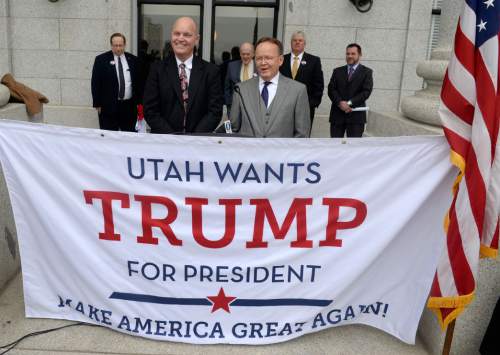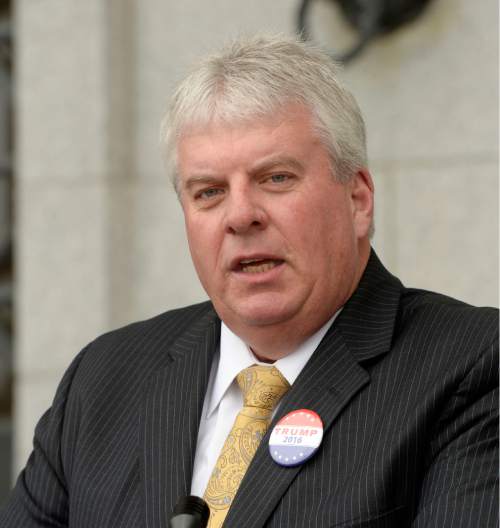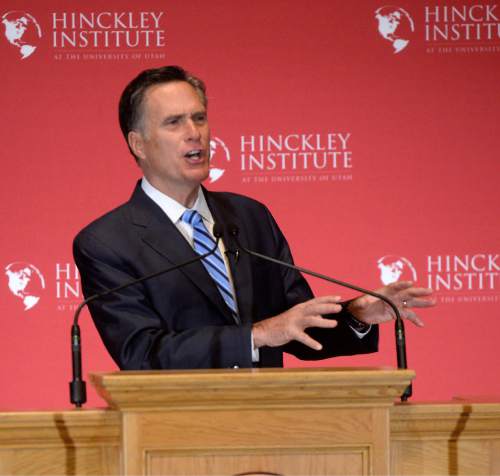This is an archived article that was published on sltrib.com in 2016, and information in the article may be outdated. It is provided only for personal research purposes and may not be reprinted.
It's not just Mitt Romney who has a problem with Donald Trump.
Polls and election results from Idaho and Wyoming show that Mormons generally don't like the Republican front-runner.
There aren't enough LDS voters to derail the Trump train, but they could complicate the race with the possibility of a March 21 debate in Salt Lake City (Trump has said he doesn't want to participate) and the Utah caucuses the next day — a vote that Trump is likely to lose.
The reason for the Mormon iciness? Likely everything from Trump's tabloid-ready personal life to his exclusionary policies on immigration and Islam. Mormons also see him as an unsavory candidate who doesn't respect other religions, according to Matt Miles, a political scientist at LDS Church-owned Brigham Young University-Idaho.
"You have a group who cares more about politics than the church, those Mormons tend to be Trump supporters," Miles said. "For those religion-first Mormons, they won't support Trump. They'll say he had too many divorces, and they don't see him as a strong moral leader."
Don Peay is a Mormon who supports Trump, and he calls on fellow faithful to look past the "superficial" to see a tough candidate who will protect them.
One core issue for many Latter-day Saints, according to Miles, is Trump's call to block Muslims from entering the United States as a safeguard against terrorism. That stance stirs fear among members of a faith that has its own history of persecution. And, in defense of this policy, a Trump spokeswoman mistakenly referred to the feds shutting down "Mormon churches," when she actually meant the Fundamentalist Church of Jesus Christ of Latter-Day Saints, a breakaway sect that practices polygamy.
In December, the Salt Lake City-based Church of Jesus Christ of Latter-day Saints issued a statement in response to Trump's position highlighting a quote from Mormon founder Joseph Smith defending the religious rights of many faiths.
That may explain why Texas Sen. Ted Cruz walloped Trump in the heavily Mormon areas in southern Idaho en route to a 17 percentage point win in the state. Idaho, the state with the second most LDS residents, was Trump's only loss among the four states holding presidential contests last Tuesday. Trump had an even worse showing in Wyoming, which has the third-highest Mormon population. He got only 7 percent of Saturday's caucus vote, while Cruz amassed 66 percent.
Utah pollster Dan Jones conducted a survey of Idaho's Republican voters before the primary and found that Trump had a decent lead over Cruz — 30 percent to 19 percent. But Idaho Mormon voters favored Cruz by 24 percent to Trump's 18 percent.
Jones' poll, on behalf of Zions Bank's Idaho Politics Weekly, was conducted before Romney delivered his blistering attack on Trump in a televised speech at the University of Utah.
In that address, Romney, a Mormon and the 2012 Republican presidential nominee, slammed Trump for being a bully, a bad businessman and a politician who could lead the nation into "the abyss."
Jones argues that Romney's speech likely had a significant impact on LDS voters, and the pollster shared his own view on why Mormons haven't taken to Trump: "It is because of his language, his arrogance and crudeness, to be honest with you." Trump has peppered his rallies with expletives and in a recent debate referred to the size of his penis.
Jones conducted a poll of Utah Republican voters in mid-February that showed Trump coming in third behind Cruz and Sen. Marco Rubio, R-Fla., one of his worst showings in any survey.
Beyond Trump's occasional cursing, he said, Mormons tend to be more liberal on immigration, where Trump has taken a hard line, promising to build a huge wall along the southern border and to force Mexico to pay for it.
Jones also said Latter-day Saints tend to be more accepting of establishment players, like Romney, rather than insurgent figures, like Trump.
The Idaho vote was more anti-Trump than pro-Cruz, Jones believes, because his polling shows that the Texas senator is not particularly well liked in the Gem State.
But Miles, the BYU-Idaho professor, believes many southern Idahoans, including Mormons, were attracted to Cruz's focus on the U.S. Constitution.
Jones' polling has shown little difference in the views of people from Rexburg, Idaho, down through Utah's Wasatch Front — but Trump still resonates with some high-profile Utahns.
In late February, some backers stood on the steps of Utah's Capitol to proclaim their support for the billionaire celebrity. The event followed a trip to the state by Donald Trump Jr., who not only enjoyed some fishing in Utah, but also mingled with legislators. The Trump supporters include Utah Senate Majority Leader Ralph Okerlund, R-Monroe; Sen. Stuart Adams, R-Layton; and Peay, the influential founder of Sportsmen for Fish and Wildlife.
While saying that even they take issue with Trump's stance on immigration and Muslims, these Utah supporters believe he is a take-charge politician who could change the nation for the better. In particular, they believe Trump would provide more local control of public lands, an issue dear to many Utah Republicans.
"It's so nice to have a candidate who understands Utah issues," Okerlund said, "who understands how important resources are to our country."
Peay, who described himself as "an active, hard-core" Mormon, said last week that Latter-day Saints need to "take the time to understand Donald Trump," looking past the language, which he called "superficial."
He said Trump is a successful businessman and a good father, but, most importantly, a decisive leader.
"We are not electing a pastor and we are not electing a minister, we are electing the president," Peay said. "The world is a pretty tough place. We need a tough guy in the White House."
Trump has repeatedly chided Romney as a failed candidate and a "choke artist," but his criticism hasn't often veered to the former Massachusetts governor's religion.
It did stray to the LDS faith, though, in an interview with BuzzFeed's McKay Coppins, who recounted the conversation in a New York Times opinion piece in which he argued that Trump is intolerant of religions beyond mainline Protestant Christianity.
As Coppins tells it, Trump started arguing that Romney lost to President Barack Obama because of his odd faith. Only when Coppins told Trump that he was Mormon did the candidate tone it down, according to Coppins, saying: "You know, people don't understand the Mormon thing. I do. I get it."
Twitter: @mattcanham







